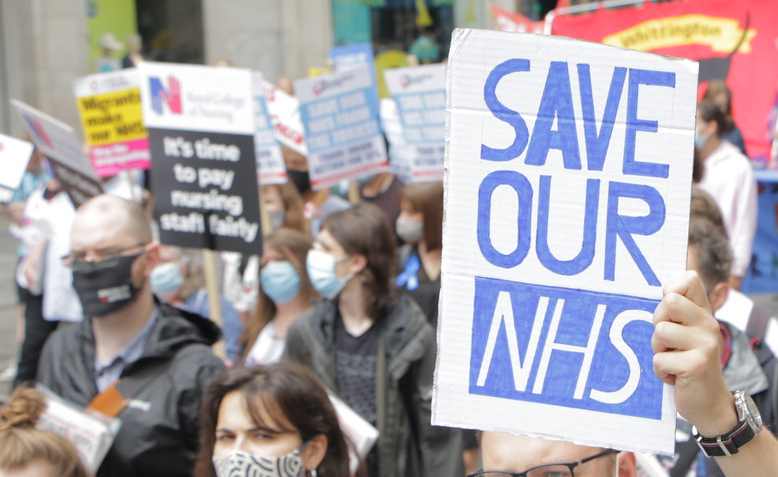 NHS rally, 2021 Photo: Socialist Appeal Flickr
NHS rally, 2021 Photo: Socialist Appeal Flickr
The sale of our hospitals and healthcare is well under way, says Mona Ahmed, and it’s time to fight back
NHS privatisation is not the hospital finance department coming to you with a card machine after a procedure to demand payment. It is true that we will increasingly be expected to pay for treatment, for elective procedures in particular, but the withdrawal of healthcare that is free at the point of need has been a much more subtle process. It has been a process of the gradual but relentless erosion of the service to render it simply unable to cope with the needs of patients, who now have no option but to turn to the private sector.
The last twelve years have seen unprecedented attacks on the NHS via multiple channels. There has been defunding, active withdrawal of vital services, and attacks on working conditions, which have forced staff to turn their backs on the service in record numbers (resulting in a staggering 130,000 vacancies at the last count). All of this has meant that the number of people waiting for treatment has climbed to record levels with private healthcare providers and their shareholders being the main beneficiaries.
According to the latest NHS England figures, the number of people in England waiting for routine hospital treatment is now at a record 6.8 million. As of May 2022, 2.41 million people were facing waiting times longer than five months, while more than 331,000 will wait more than a year to receive NHS treatment.
Running alongside this, and as if by design, demand for private healthcare is soaring. Patients, or those who can afford to, are turning to the private sector in record numbers to avoid suffering the pain and anxiety of a deteriorating health condition, with the number of people paying for their treatment increasing by 39% between 2019 and 2021 alone. According to a survey commissioned by the charity Engage Britain, of those who opted to pay for treatment in that time, 63% did so because they faced long delays with the NHS and 46% said they had to raid their savings or get into financial debt to fund their treatment.
This increased reliance on private healthcare will only exacerbate the profound health inequalities which already see those from socially deprived backgrounds forced to spend a greater proportion of their lives in ill health, before dying earlier than their rich counterparts. The poorest, for whom going private is simply not an option (even before the escalating cost of living) will be left waiting the longest for NHS treatment, with more negative impacts on long-term physical and mental health and on their ability to work.
It wasn’t just the pandemic
So weakened had the NHS become due to a decade of cuts, marketisation and staff shortages that most elective procedures simply had to be withheld in an attempt to manage the demands of the pandemic (with devastating consequences for cancer patients in particular). This has no doubt contributed to the current backlog, however these problems long predate March 2020, and we must reject any attempts to blame these record waiting lists solely on the demands of Covid-19.
In fact, NHS waiting-time targets (which state that 92% of those on waiting lists should receive their treatment within eighteen weeks) have not been met since early 2016. In the decade leading up to the pandemic, the NHS suffered the longest sustained reduction in healthcare spending (as a percentage of GDP) in the NHS’s history. This was coupled with a 14% real-terms pay cut for nurses, which saw thousands leave the profession, while the removal of the NHS student bursary in 2016 deterred many from joining it – precisely as was warned. The result is that the number of patients on NHS waiting lists since 2009 has now more than tripled.
So due to being deliberately starved of resources, the NHS is now being forced to withhold free, timely healthcare from millions. This has been decades in the making, and the result is patients being failed, while private health companies reap the profits. Healthcare that is available free at the point of need has been undermined and, instead, the provision of all but the most urgent treatment will be based not on clinical need, but on the ability to pay.
It is difficult to overstate just how far we have drifted from Bevan’s radical vision of a free, publicly owned healthcare system. Either we act now to demand an end to the defunding and privatisation that brought us here, or else a universal equitable National Health Service will be lost forever.

